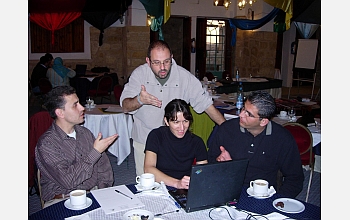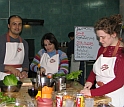|

Discovery
Bonding in the Middle East

Nobel chemist helps young scientists across the region strengthen ties, work together
April 6, 2006
The official reason for the students' presence was simple--to attend a weeklong workshop about chemical bonds. But for the 13 participants from throughout the Middle East, the metaphor was not lost.
Workshop architect Roald Hoffmann says that was exactly the point. An endowed chair of humane letters at Cornell University, Hoffmann won a Nobel Prize in 1981 (with Kenichi Fukui) for his work explaining the course of chemical reactions. Now, he says, "I wanted to get younger people involved. I had a dream of getting future leaders in chemistry together. And my second idea was, let's push things and move into the region, so as to get people used to working within the Middle East."
Inspired by earlier conferences in Malta that brought together chemists from across the region to make connections and overcome political boundaries, Hoffman invited students from Iran, Israel, Egypt, Saudi Arabia, the Palestinian Authority, Syria and Jordan to meet in Petra, Jordan.
"I wanted to take the spirit of the Malta meetings to a different level," says Hoffmann.
Hoffmann's effort is funded as part of the National Science Foundation's (NSF) Discovery Corps, a pilot program that explores innovative ways for scientists to combine their research expertise with service to society. He plans three workshops all together.
The first, in Petra, was held Jan. 12-19, 2006, and was co-taught by University of Barcelona chemist Pere Alemany. For security reasons, the Petra workshop was low-key. Everyone was well aware of ongoing violence in the region. One Turkish student bowed out the day before the workshop, citing personal safety concerns. But the rest took the risks in stride.
A second meeting focusing on nanochemistry is slated to be held in Egypt later in 2006, and a third on bioinorganic chemistry will be held in Qatar, Iraq, in 2007.
The students at Petra learned chemistry, certainly. But the defining moments Hoffmann most remembers are the human ones: the meal the students cooked together, for example, or the simple Arabic girls' game--the group in a circle, dancing around a single person in the center--they played while waiting for a bus.
"There was an extraordinary amount of talk about politics and religion," Hoffmann recalls. There was also music and the kind of friendship-building that happens after grueling days of shared work. Hoffmann and Alemany taught for nine hours each day.
Back at Cornell, Hoffmann read the participants' anonymous evaluations.
"We could not have asked for more, and we are forever grateful," wrote one student. "I do sincerely hope that our paths will cross again soon."
"I think that special and strong friendships were made in the workshop," wrote another. "I felt that people really connected with each other, and it was interesting and beautiful to see."
Hoffmann wrote his own evaluation, of sorts, in his interim report to NSF:
"Atoms bond, or fail to do so, in very specific ways so as to make up those larger, useful molecules whose complexity ultimately allows the richness of life, the balance of risk and benefit that makes a molecule mean something to us. The attraction of the opposite charges overcomes the repulsion of the like ones. Atoms bond. They bond, sometimes sharing electrons, sometimes transferring them between each other. Inanimate, atoms have no option. Human beings have a choice."
He is grateful for the opportunity to watch his students make that choice.
"I wanted the bonding to take place," he says. "And it was wonderful and touching that it did."
-- Lauren Gold, Cornell University.
Investigators
Roald Hoffmann
Related Institutions/Organizations
Cornell University - Endowed
Related Awards
#0513475 Discovery Corps Senior Fellowship: Workshops in Chemistry in the Middle East
Years Research Conducted
2006
Total Grants
$104,000
|




